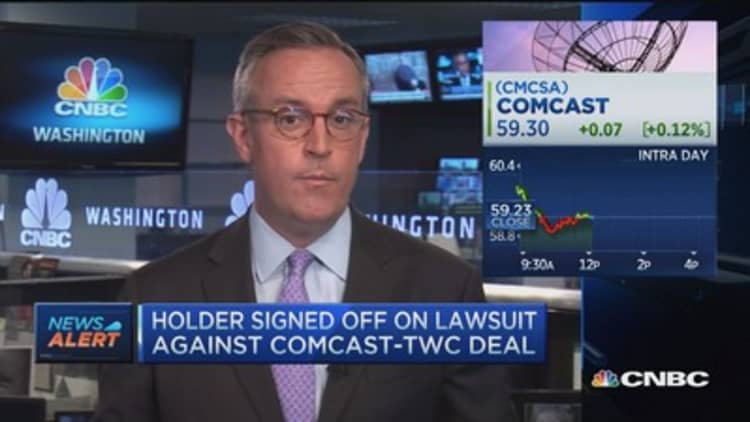
Justice Department staff briefed Attorney General Eric Holder on their recommendation to block the pending Comcast/Time Warner Cable merger "a couple of weeks ago," an agency official said Friday. "We said, if we go in this direction, will you support us," the official said. "And the AG said, 'Yes, I'm with you.'"
That decision by Holder made the final outcome of the transaction—which CNBC owner Comcast officially bowed out of Friday morning—nearly inevitable. The key objection, the official said, was that the enlarged Comcast would control about 60 percent of the nation's broadband connections.
At a final meeting in Washington at 3 p.m. on Wednesday, a small group of DOJ lawyers met with two Comcast employees at an agency facility on 5th Street NW, to lay out their concerns about the deal. According to the official, who spoke on condition of anonymity, Comcast was offered the opportunity to engage in followup meetings, and to run out the official process.
But the writing was on the wall.
By late Thursday, Comcast called the DOJ to set up a final conference call for 7:30 a.m. Friday. On that call, Comcast formally ended the $45 billion bid for Time Warner.
"I don't think they did anything wrong," the DOJ official said of Comcast. "They wanted to do a transaction, and they figured it was worth a shot."
Read MoreComcast ends pursuit of Time Warner Cable acquisition
Asked what other companies should learn from this, the official said that the rejection of the deal shows Justice will do a deep dive into even the most convoluted transactions. "The takeaway is you shouldn't assume we're not going to tackle really complex transactions and get our arms around them," the official said.
The official also said the DOJ simply didn't buy Comcast's argument that the deal would not be harmful to consumers. "People thought: They don't overlap geographically in the downstream market, so that's not a problem. But the deal was about more than that," the official said. "And when you have one company that has 60 percent of the broadband connections, that's a big deal."
Comcast did not reply to a CNBC request for comment on this story. Earlier Friday, Chairman and CEO Brian Roberts said on CNBC that it became clear the deal "wasn't going to happen."
"That was the judgment we heard and the government had reached," he said in a "Squawk Box" interview. "We have to live with it and respect that."
Read MoreComcast's Roberts: TWC deal off, 'no looking back'
Holder's decision was one of his last major acts as attorney general. Loretta Lynch was confirmed by the Senate on Thursday as his successor.
Disclosure: Comcast is the owner of NBCUniversal, the parent company of CNBC and CNBC.com.


